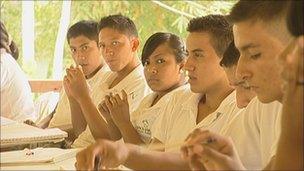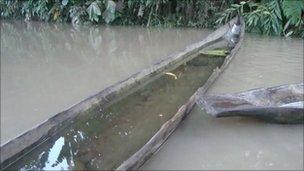Ecuador children tell of rainforest dilemmas
- Published
Children of the Rainforest - Primary
2011 is the UN Year of the Forest. Schools World Service travelled to Mondana, a small village in Ecuador, to hear pupils' views on finding the balance between making a living and protecting the environment.
Fishing with dynamite
On our first morning in the rainforest, we asked a class of secondary school pupils at Yachana Technical High School how many had fished with dynamite. At least half raised their hands.

Many of the pupils in this class have fished with dynamite
Dynamite fishing can bring back huge quantities of food.
A child from another school in the same village, Juan Ortega Secondary School, said that when his father fishes with dynamite he can catch enough fish for the family, the village, and even take it to his grandparents' village to share there.
He also talked about his disappointment the last time they fished and caught nothing.
The practice seems to be widespread, but many children gave examples of injuries. Alfredo, 16, said his grandfather had lost a hand in the process.
Our translator, Robert, a young man from the village who works as a tourist guide, told us more.
First, termites are scattered on the water to attract the fish. The dynamite is lit, and has to be thrown immediately at the area in which there seems to be the most fish. It's in that moment that hesitation can result in injury.
Robert also remembered watching dynamite fishing as a young boy and seeing the fisher lose his hands.
The practice is dangerous for people and environment alike, killing fish indiscriminately. We were told that it has recently been made illegal and has become less common.
Timber
Henry, aged 17, also attends Yachana High.
Speaking beside a spectacular mahogany tree at the edge of the rainforest, he told us his parents have a small farm six hours' walk from the school.
They make money by felling trees and selling the timber - work Henry sometimes helps his father with.
The family is relatively new to the Amazon basin. Henry's father moved there as a child and he said his grandparents were slaves on a highland farm.
Like many of the people who live in the Ecuadorian rainforest today, they do not have a long-standing tradition of jungle knowledge.
Yachana High school puts the environment at the heart of its education programme, and is funded and run by the Yachana Foundation, external, an environment and development project.
Since Henry began attending the school, he has started to question the family business and he has asked his father to stop cutting down trees.
He said his father doesn't agree. He has always felled trees - it's his job. Henry has found himself in opposition to his family and the rest of the community, who also rely on timber for income generation.
The same was true for other pupils when we asked about the impact of oil, which is big business in the Ecuadorian Amazon.
There has been some serious pollution in Ecuador as a result of the oil industry. Pupils like Dalia and a second Henry told us they are worried that this could happen again.
Both Dalia and Henry said oil companies had been investigating in their villages. They both said that their communities were hopeful the oil industry would bring jobs and money.
Road-building

Napo river canoe - replaced by the bus
In contrast to Yachana High, pupils at the local state school, Juan Ortega, focused more on the way different industries brought improvements to the quality of their lives.
Juan Ortega pupils are taught about ecosystems, and they said they loved living in the rainforest - playing with monkeys and fishing for piranhas.
But they were also grateful for the simple benefits of development.
Lizbeth, 17, showed us the road which has recently been built through her village at the request of the community.
For Lizbeth and her mother Rosa, the road means a safer and easier journey to market to sell their crops. Now they take the bus.
But the road has increased opportunities for travel and trade, giving access for people to come and help themselves to the forest's resources - with or without permission.
Life in the Amazon is changing fast, and many of the young people we met welcome the changes.
But they also find themselves faced with some stark tensions between protecting the forest and the needs of their own families and communities.
Schools World Service is a BBC-British Council co-production.